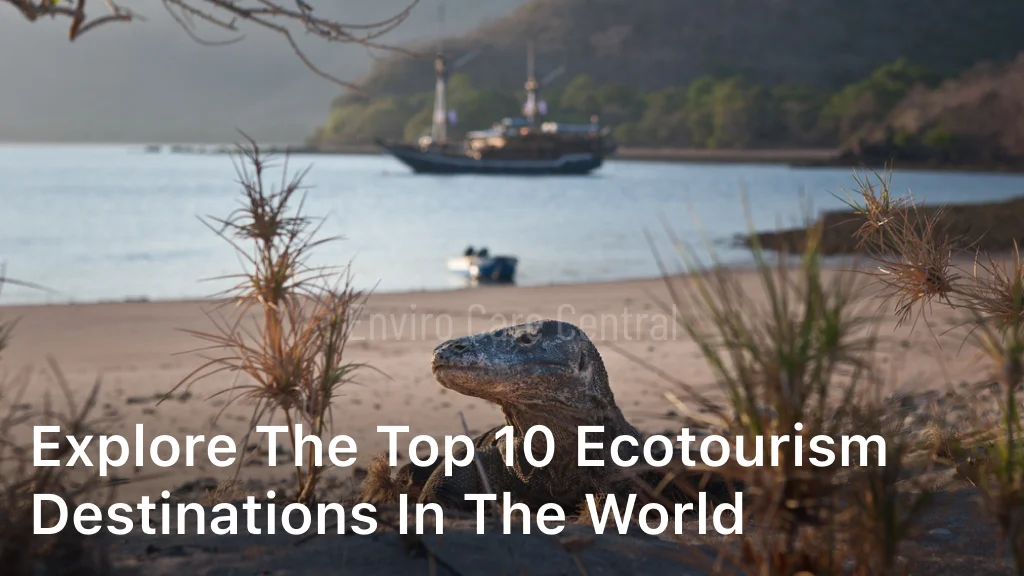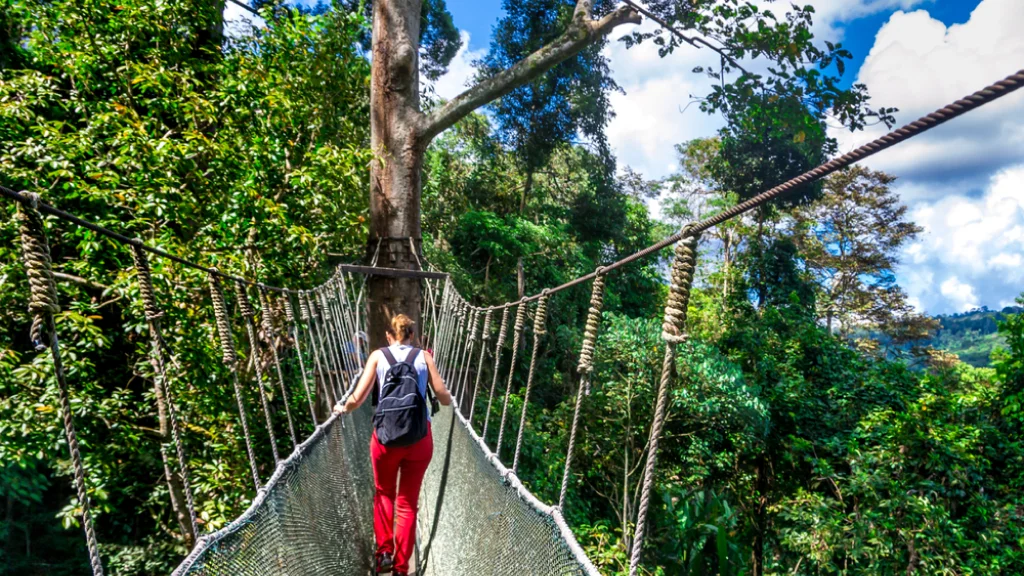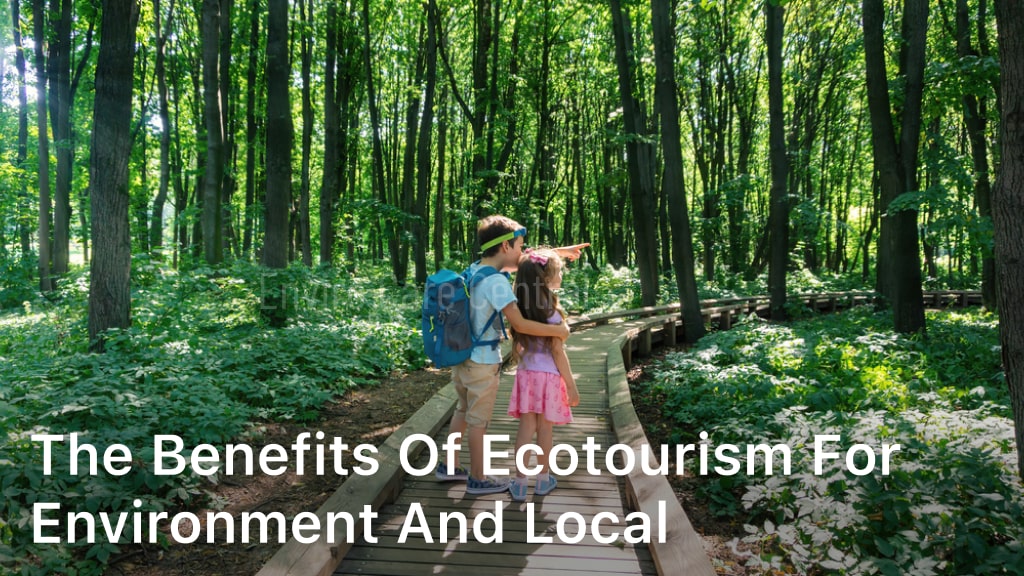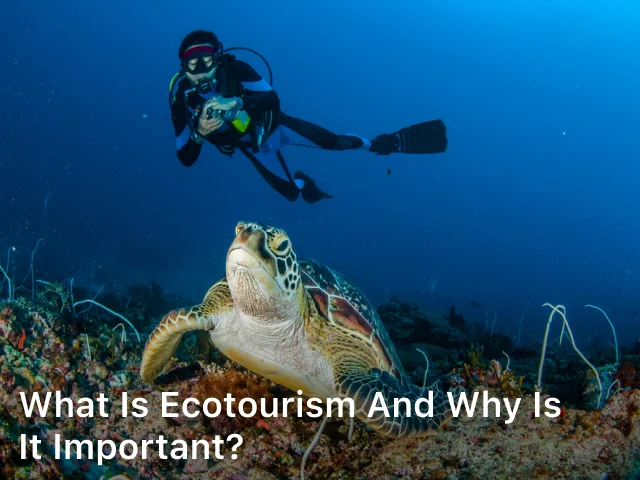Explore the Top 10 Ecotourism Destinations in the World

envirocarecentral.com. Explore the Top 10 Ecotourism Destinations in the World – Dive into our guide on the top 10 ecotourism destinations in the world. Discover untouched landscapes, majestic wildlife & sustainable practices.
Welcome to our journey of discovering the most extraordinary ecotourism destinations around the world. As nature lovers, we understand the importance of sustainable tourism and strive to promote destinations that focus on preserving the environment.
In this article, we will take you on a virtual tour of the top 10 ecotourism destinations in the world, showcasing their breathtaking beauty and sustainable practices.
From the untouched landscapes of Bhutan to the diverse wildlife of Kenya, these destinations offer unforgettable experiences for eco-conscious travelers. Get ready to be mesmerized by the stunning landscapes, encounter unique species, and learn about the rich cultural heritage of these destinations.
Key Takeaways
- Discover the top 10 ecotourism destinations in the world
- Learn about sustainable tourism practices
- Explore breathtaking natural landscapes
- Encounter unique wildlife species
- Immerse yourself in rich cultural experiences

Top 10 Ecotourism Destinations in the World
- Costa Rica: Renowned for its biodiversity, Costa Rica offers numerous national parks and reserves, such as Corcovado National Park and Monteverde Cloud Forest Reserve.
- Galápagos Islands, Ecuador: Famous for its unique wildlife and Charles Darwin’s observations, the Galápagos Islands are a UNESCO World Heritage site.
- Norwegian Fjords, Norway: Norway’s fjords provide stunning natural beauty and opportunities for eco-friendly activities like hiking and wildlife watching.
- Borneo, Malaysia and Indonesia: Home to diverse ecosystems, Borneo is known for its rainforests, orangutans, and efforts in sustainable tourism.
- New Zealand: With its emphasis on conservation and outdoor recreation, New Zealand offers pristine landscapes, national parks, and a commitment to environmental protection.
- Patagonia, Argentina and Chile: This region is celebrated for its vast wilderness, including glaciers, mountains, and unique wildlife.
- Iceland: Known for its geothermal wonders, waterfalls, and commitment to renewable energy, Iceland is a leader in sustainable tourism.
- Tasmania, Australia: This island state is recognized for its untouched wilderness areas, including the Tasmanian Wilderness World Heritage Area.
- Switzerland: Beyond its picturesque landscapes, Switzerland is known for its eco-friendly practices, including efficient public transportation and sustainable tourism initiatives.
- Kenya: Renowned for its safari experiences, Kenya emphasizes conservation efforts in its national parks and reserves, such as the Maasai Mara National Reserve.
Before planning a trip, it’s advisable to check for the latest information on each destination’s eco-friendly initiatives and ensure that they align with your expectations for responsible tourism.
Costa Rica – A Tropical Paradise for Ecotourism Enthusiasts
When it comes to ecotourism, Costa Rica is a tropical paradise that should be on every nature lover’s bucket list. This Central American gem is renowned for its commitment to conservation and sustainable tourism, making it an ideal destination for those who want to experience the beauty of nature while minimizing their impact on the environment.
Exploring Costa Rica’s lush rainforests, stunning beaches, and diverse wildlife is a truly unforgettable experience. Whether you’re looking for a relaxing eco-friendly vacation or a thrilling adventure, you’ll find it here. From zip-lining through the canopy to surfing some of the best waves in the world, Costa Rica offers something for everyone.
Sustainable Lodging
Costa Rica is home to a wide variety of eco-friendly lodging options, from rustic cabins to luxurious resorts. Many accommodations use sustainable practices such as solar power, rainwater harvesting, and composting toilets to minimize their impact on the environment. Some resorts even have their own wildlife sanctuaries, where guests can observe and learn about the local flora and fauna.
Wildlife Refuges
Costa Rica is home to over 500,000 species of plants and animals, many of which are endangered or threatened. To help protect these species, the country has established over 30 national parks and wildlife refuges. Visitors can explore these protected areas on guided tours, where they can observe monkeys, sloths, toucans, and other creatures in their natural habitat.
Adventure Opportunities
If you’re looking for an adventure, Costa Rica won’t disappoint. From white-water rafting to hiking active volcanoes, there are plenty of heart-pumping activities to choose from. And for those seeking a more laid-back experience, the country’s beaches offer world-class surfing, snorkeling, and diving opportunities.
Overall, Costa Rica’s commitment to sustainability and conservation makes it an ideal destination for ecotourism enthusiasts. With its breathtaking natural beauty, diverse wildlife, and thrilling adventures, it’s no wonder that this tropical paradise is considered one of the top ecotourism destinations in the world.
Galapagos Islands – The Land of Unique Biodiversity
Located off the coast of Ecuador, the Galapagos Islands offer an unparalleled experience for nature lovers. As one of the most unique and biodiverse places on the planet, the islands boast a vast array of species that cannot be found anywhere else in the world.
From giant tortoises to marine iguanas, the Galapagos Islands are home to an incredible variety of wildlife. Visitors can witness firsthand the evolution of species that inspired Charles Darwin’s theory of natural selection.
The islands’ pristine ecosystems are carefully preserved by the Ecuadorian government and can be explored through organized tours conducted by licensed operators. Visitors can snorkel and scuba dive with sea turtles, stingrays, and even sharks, or hike through volcanic landscapes and witness lava formations.
Conservation Efforts
The Galapagos National Park and the Galapagos Marine Reserve work tirelessly to preserve the islands’ unique biodiversity. Strict regulations are in place to protect the islands, and visitors are required to adhere to guidelines to ensure they do not disturb the local ecosystems.
The local communities also play a crucial role in conservation efforts. The Galapagos Conservancy, a nonprofit organization, works with local communities to support environmental education and promote sustainable tourism practices.
Why Visit the Galapagos Islands?
The Galapagos Islands offer visitors a one-of-a-kind experience, unlike anywhere else on earth. From swimming with sea lions to hiking through lava tunnels, visitors can immerse themselves in the islands’ untouched and unique environments.
Moreover, by visiting the Galapagos Islands, visitors are supporting crucial conservation efforts that are necessary to preserve the islands’ biodiversity for future generations.
In Conclusion
The Galapagos Islands are a must-visit destination for nature enthusiasts seeking a one-of-a-kind experience. With their unique wildlife and breathtaking landscapes, the islands offer a truly unforgettable experience. And by practicing sustainable tourism and supporting conservation efforts, visitors can help ensure that the Galapagos Islands remain a natural wonder for generations to come.
Norway – Where Mountains and Fjords Meet Sustainability
Norway is much more than its majestic mountains and awe-inspiring fjords. It’s a country that has made significant strides in protecting its pristine natural environment and promoting sustainable practices.
Visitors to Norway can witness the country’s commitment to sustainability in various ways. For instance, Norway has a robust public transportation system that relies heavily on electric vehicles and buses that run on biogas.
Additionally, Norway has taken a strong stance on sustainable fishing practices to protect its abundant marine life, and visitors can enjoy fresh, sustainably sourced seafood in local restaurants.
The country’s commitment to sustainable practices extends beyond its cities and into the countryside. Norway has implemented strict regulations and programs that help preserve the country’s national parks, forests, and other natural areas.
One of the most notable natural attractions in Norway is its fjords – deep, glacially carved inlets that are a testament to the country’s stunning beauty. Some of the most popular fjords to explore include the Geirangerfjord and the Nærøyfjord, both of which have been designated as UNESCO World Heritage Sites.
| Top Natural Attractions in Norway | Description |
|---|---|
| Preikestolen | A cliff that towers 604 meters above Lysefjord, offering breathtaking views. |
| Trolltunga | A spectacular rock formation that hangs 700 meters over Ringedalsvatnet lake. |
| Nordkapp | A rugged, picturesque headland that marks the northernmost point of Europe. |
Another popular attraction in Norway is the Northern Lights, a spectacular natural light display that can be seen from various locations in the country. Visitors can experience the Northern Lights from the comfort of a heated glass igloo or by taking a guided tour to remote areas to witness the phenomenon in person.
For those seeking adventure, Norway offers a host of activities that allow visitors to experience its natural beauty up close. Hiking, kayaking, skiing, and even dog sledding are popular activities that allow visitors to explore Norway’s rugged terrain and unique natural features.
Overall, Norway is a destination that showcases the beauty of nature and the importance of sustainable practices in preserving it. From its majestic mountains and fjords to its commitment to eco-friendly transportation and sustainable fishing, Norway is a top destination for nature enthusiasts seeking to experience the great outdoors in a responsible and sustainable way.
Kenya – An African Safari Adventure with a Conservation Focus
When it comes to ecotourism destinations, Kenya is a must-visit for those seeking a unique and environmentally conscious adventure. The country’s rich biodiversity is on full display, with its vast savannahs, dense forests, and shimmering lakes playing host to a diverse range of wildlife.
But Kenya’s commitment to conservation goes beyond just offering visitors a glimpse of its natural wonders. In fact, ecotourism and wildlife conservation are inextricably linked in the country, with many local communities actively involved in protecting their natural heritage and promoting sustainable practices.
One of the best places to experience Kenya’s passion for conservation is Masai Mara, a unique ecosystem that is home to some of the world’s most iconic wildlife, including lions, leopards, and elephants. Visitors can embark on guided safari tours with experienced trackers, immersing themselves in the magnificent landscapes of this vast wilderness.
But the Masai Mara experience goes far beyond just observing wildlife. Visitors can also learn about the local Maasai culture and their close relationship with the land, gaining a deeper understanding of the region’s history and traditions.
African Safari Adventures with a Difference
What sets Kenya apart from other African safari destinations is its focus on ecotourism and community-led conservation. Visitors can choose from a range of activities that not only showcase the country’s impressive natural beauty but also contribute to its long-term sustainability.
For example, visitors can embark on guided nature walks led by local Maasai guides, gaining insight into the local flora and fauna while supporting community-led conservation initiatives. Or, visitors can choose to stay at one of the many eco-friendly lodges and campsites that prioritize sustainability and responsible tourism.
Conserving Wildlife for Future Generations
Kenya’s commitment to conservation extends beyond just ecotourism. The country has taken innovative steps to protect its wildlife, including introducing strict anti-poaching laws and establishing wildlife corridors to allow animals to safely migrate across the country.
One of the most impressive conservation projects in Kenya is the Ol Pejeta Conservancy, a 90,000-acre wildlife reserve that is home to endangered species such as black rhinos and Grevy’s zebras. The conservancy has also partnered with local communities to promote sustainable agriculture and protect the surrounding ecosystems.
Australia – Diverse Landscapes and Rich Indigenous Culture
Australia is a country of incredible natural diversity, showcasing some of the world’s most unique ecosystems. From the stunning Great Barrier Reef to the vast Outback, there is something for everyone in this land down under.
One of the best ways to experience Australia’s diverse landscapes is through ecotourism. There are many eco-friendly accommodations and guided tours that allow visitors to explore the country’s natural wonders while minimizing their impact on the environment.
Diverse Landscapes
Australia is home to a wide range of landscapes, each with its unique flora and fauna. The Great Barrier Reef is the world’s largest coral reef system, teeming with colorful fish, sharks, and other marine life. The rainforests of Queensland and New South Wales are home to unique species such as the cassowary and tree kangaroo. The rugged Outback is home to iconic animals such as kangaroos and emus, as well as awe-inspiring landmarks such as Uluru.
| Landscape | Key Features |
|---|---|
| Great Barrier Reef | World’s largest coral reef system; home to thousands of marine species |
| Rainforests | Home to unique species such as the cassowary and tree kangaroo |
| Outback | Rugged landscape home to kangaroos, emus, and Uluru |
Indigenous Culture
Australia’s indigenous peoples have lived in harmony with the land for thousands of years, and their cultures and traditions remain an essential part of the country’s identity. Visitors can learn about indigenous history and customs through guided tours and cultural experiences.
“The indigenous culture is an essential part of what makes Australia unique, and we are committed to preserving and promoting it through sustainable tourism.”
Bhutan – A Himalayan Kingdom Committed to Gross National Happiness
Are you ready to explore a country where happiness is a national priority? Look no further than Bhutan, a tiny Himalayan kingdom that has prioritized environmental conservation and sustainable development for decades.
But what exactly is Gross National Happiness, you may ask? It is a holistic approach to development that emphasizes four pillars: sustainable and equitable socio-economic development, conservation of the environment, preservation and promotion of culture, and good governance. These pillars have been guiding Bhutan’s development since the term was coined in 1972.
Environmental Conservation
Bhutan is known for its pristine forests, which cover over 70% of the country. These forests are protected by law, and Bhutan has committed to maintaining at least 60% of the country’s land area under forest cover.
The country has also pledged to remain carbon neutral, meaning that its carbon dioxide emissions are offset by carbon sequestration through forest preservation.
Bhutan’s commitment to conservation extends beyond its forests. The country is home to rare and endangered species, such as the black-necked crane and the Bengal tiger. To protect these animals and their habitats, Bhutan has established national parks and wildlife reserves.
Sustainable Development
Bhutan has made significant progress in sustainable development, with a focus on improving the standard of living for its citizens while minimizing negative environmental impacts. The country has embraced hydropower as a clean and renewable energy source, and exports excess power to neighboring countries.
In addition, Bhutan has developed eco-friendly tourism initiatives that prioritize low-impact activities and promote cultural exchange. Visitors to Bhutan are required to book through a licensed tour operator and pay a minimum daily fee, which includes accommodations, meals, transportation, and a sustainable tourism royalty that supports community development.
Cultural Preservation
Bhutan has a unique culture that has been shaped by its isolation and geography. The country’s traditional dress, architecture, and festivals are integral parts of its identity.
To preserve this cultural heritage, Bhutan has implemented policies such as mandatory use of traditional architecture in new construction and a requirement that Bhutanese citizens wear traditional dress in public.
The country has also embraced the concept of “GNH education”, which promotes the values of Gross National Happiness in schools and universities. This education emphasizes the importance of sustainability, community well-being, and cultural preservation.
Conclusion
In conclusion, we have taken you on a journey to explore the top 10 ecotourism destinations in the world. These destinations offer unique experiences while promoting sustainable practices and conservation efforts.
Costa Rica showcases a tropical paradise for ecotourism enthusiasts with its commitment to conservation and eco-friendly lodging. The Galapagos Islands offer a one-of-a-kind experience with their untouched ecosystems and unique biodiversity.
Norway’s majestic mountains and stunning fjords highlight the country’s commitment to sustainability. Kenya’s African safari adventure focuses on wildlife conservation and supporting local communities.
Australia’s diverse landscapes and rich indigenous culture provide an immersive eco-friendly experience. Bhutan’s Himalayan Kingdom prioritizes Gross National Happiness and sustainable development.
Whether you seek wildlife encounters, breathtaking natural beauty, or cultural immersion, these destinations have something for every ecotourism enthusiast. Start planning your next eco-friendly adventure today and be a part of the global movement towards sustainable tourism.
FAQ
What is ecotourism?
Ecotourism refers to responsible travel to natural areas that conserves the environment, sustains the well-being of local communities, and provides educational experiences for visitors.
Why is ecotourism important?
Ecotourism plays a crucial role in promoting sustainable practices and conservation efforts. It helps protect natural resources, supports local economies, and raises awareness about environmental issues.
What makes a destination an ecotourism destination?
An ecotourism destination is characterized by its commitment to sustainability, conservation efforts, preservation of local cultures, and the promotion of responsible tourism practices.
How can I contribute to ecotourism?
You can contribute to ecotourism by choosing eco-friendly accommodations, supporting local communities, respecting wildlife and their habitats, and minimizing your environmental impact during your travels.
Are ecotourism destinations only for nature enthusiasts?
No, ecotourism destinations offer something for everyone. Whether you are a nature enthusiast, adventure seeker, cultural explorer, or simply someone looking for a unique travel experience, ecotourism destinations have much to offer.
Can I visit ecotourism destinations with my family?
Yes, many ecotourism destinations are family-friendly and offer activities suitable for travelers of all ages. It’s a great opportunity to inspire a love for nature and a sense of environmental responsibility in children.
Are ecotourism destinations expensive?
The cost of visiting ecotourism destinations varies depending on factors such as location, accommodation choices, and activities. While some destinations may be more affordable than others, there are options available for different budgets.
How do I find eco-friendly accommodations in ecotourism destinations?
You can find eco-friendly accommodations by researching hotels and resorts that have eco-certifications, sustainability initiatives, and a commitment to minimizing their environmental impact. Additionally, look for accommodations that support local communities and employ sustainable practices.
Can I volunteer in ecotourism destinations?
Yes, many ecotourism destinations offer volunteer opportunities where you can contribute to conservation projects, community development, and environmental education programs. It’s a rewarding way to make a positive impact during your travels.
How can I ensure my visit to an ecotourism destination is responsible?
To ensure a responsible visit, follow guidelines provided by local authorities and tour operators, respect local cultures and traditions, avoid littering, stay on designated trails, and support local businesses and artisans.





